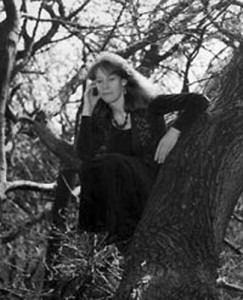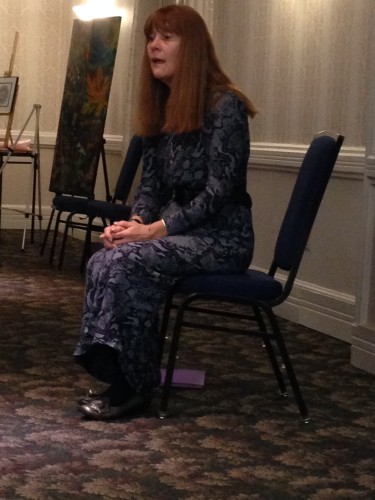NORTHAMPTON, MASSACHUSETTS –Climbing trees. Gregorian chants. Black velvet clothes. These are elements of author and priestess Vivianne Crowley’s personal spiritual journey, as told to a room packed with attendees at A Feast of Lights on Jan. 31. Weaving her own experiences and those she has observed together with cards from the Rider-Waite tarot deck, she posited a pattern of spiritual development that many modern Pagans and polytheists might find familiar.
![[Photo Credit: Carmel Sastre, CC/Flickr]](https://wildhunt.org/wp-content/uploads/2014/06/7368614064_b851cd2e40_b-500x332.jpg)
[Photo Credit: Carmel Sastre, CC/Flickr]
One tree in particular got the young Crowley’s attention in quite a literal way. “I like climbing trees,” she said, in particular, “one that was split by lightning, but still growing.” Her foot could fit in the cleft created by that lightning bolt, but a shift in the wind would close the opening and hold her fast. Rather than panicking, it was an opportunity for her to learn patience and trust. She “let the tree decide” when to free her foot, leaving her to spend considerable time with it. Eventually, she recalled, “I let my consciousness merge with the tree, so that I felt my blood was green, and we communed without shared language.”

Vivianne Crowley
Those, together with many other experiences had before she was old enough for school, were formative in creating her own path toward Wicca, and she believes that is not unusual. “Childhood experiences are often the beginning of learning to connect the self and other,” she said. Her own experiences, which included spontaneous lucid dreaming and psychic images from her mother asking her what she wanted for lunch, molded her worldview before she had language to articulate it. That caused a bit of conflict when school began. At that time in England, the curriculum included “religious studies which were really Christian studies, and included frightening stories about a god who killed people.”
“Our reality and what we’re told don’t quite match,” she said of herself and other people who started on a Pagan-like path in their youth. “Animals don’t have souls? I didn’t believe that. Animal as deity made more sense to me. I saw The Ten Commandments, and cheered for the golden calf.” In addition to an awareness of nature spirits and a then-radical alternative concept of deity, Crowley said that by the time she was eight years old, she could get out of playing sports by making it rain. This is something she attributes to the altered state of consciousness that she learned communing with that tree. Her classmates were already calling her a “witch.”
Around that time, Crowley was baptized a Roman Catholic, which excused her from “religious studies” because they were considered a violation of the tenets of Catholic doctrine. Instead, Crowley was exposed to Latin mass at a local monastery, complete with Gregorian chants. As a result, “for the first time I got a sense of that other state [of consciousness] while in a building.” She continued to identify as a witch as well as a Catholic, and by the time she was eleven she had formed a coven, which lasted only “until the headmistress found out.”
It wasn’t until she was 14 years old, and the 1960s were unfolding, that Crowley learned a name for what she was feeling. “I saw witches on TV, and they called themselves Wiccans — it was a revelation to me!” Soon thereafter her family moved to London and, after a number of false starts, she was able to discover and be initiated by a coven.

Vivianne Crowley
“I wore a lot of black velvet clothes, and was attracted to stepping out of the ordinary,” she said. This entire portion of her journey she likened to the Fool card, which usually depicts the titular character setting off alone. “Something protects us at this point. I couldn’t find Wiccans at first, so I tried Buddhists, and mediums, and avoided some pitfalls” before finally meeting “kind witches.” She was clear that she wasn’t claiming that the young are always safe from harm on this quest, only that mistakes borne of that ignorance seem to be softened or minimized to some extent.
While the seeker is under the mantle of the Fool, Crowley likened the spiritual awakening to the Star. Talent in esoteric disciplines blossoms. Interests in incense, tarot, astrology, healing, herbalism, crystals, and a variety of such activities and paraphernalia are sparked by the emerging sensitivity a newcomer to the Pagan path experience.
“The first spells we try often succeed,” she said. As mastery of these ideas and powers grows, an initiate enters into the spiritual adolescence. Crowley compares this to the Sun and Magician cards, something she jokingly called “second-degree-itis” in her own Wiccan path. It’s a period characterized by “youthful arrogance and enthusiasm,” she said. And, it is often a time when one begins to attract students. “The first time you are asked for initiation, it is humbling,” she said, “and ego-inflating.”
Power is illusion, however, and in time the Sun card is replaced by the Moon, the Magician with the Devil. This is a stage many might find familiar, with relationships going wrong and a desire to “own” one’s group often gaining strength. “We realize that there’s no perfect people,” she said, and “we can be angry that our leaders are not perfect.” For small-group traditions, such as Wicca and other practices that fall under the shadow of the Pagan umbrella, she frames the problem in alchemical terms, saying that the challenge is to “accept the lead as well as the gold. People fall out because of relationships, not the path.”
![From Rider-Waite Deck [Photo Credit: Julia Mariani / CC lic. Flickr]](https://wildhunt.org/wp-content/uploads/2015/02/2305605618_13f626f78f_z-286x500.jpg)
From Rider-Waite Deck [Photo Credit: Julia Mariani / CC lic. Flickr]
That is the time of the Hanged Man and the Wheel of Fortune, which Crowley said is characterized by uncertainty and often when “change falls out of one’s pockets.” New ideas don’t fit preconceived notions, leading one’s world to be turned upside-down. “It forces difficult questions,” she said. It is a critical juncture when those, who have long been on a particular path, decide it’s the wrong one.
However, it may be too soon to make that judgment call. Eventually one may “reach a point of understanding,” a point represented by the Hermit and High Priestess, strength and mystery. “You can have your own gods,” Crowley explained, and they are not threatened nor blocked by the gods of others.
When looking back, Crowley said, a person should be able to recognize that they are not the same person who began journey. It is important, she said, to “send our younger selves love and care, and messages of encouragement,” in order to complete the more difficult parts of that journey as “our future selves guide us.”
She explained that such guidance can help one negotiate what to do if one’s student surpass the teacher. This can happen if one’s role is that of a point of strength, rather than a leading light. Such points are more replenishing than ritual in some cases.
“The point of the journey is to bring things back,” she said in closing. “We must give to move things forward, and we all have something to teach.” In that way, the partial knowledge still held about Paganisms of old can, like a phoenix, rise from the ashes in a new form, one that is relevant and vital for the spiritual, environmental, and political challenges of today.
The Wild Hunt is not responsible for links to external content.
To join a conversation on this post:
Visit our The Wild Hunt subreddit! Point your favorite browser to https://www.reddit.com/r/The_Wild_Hunt_News/, then click “JOIN”. Make sure to click the bell, too, to be notified of new articles posted to our subreddit.
Very nice, I like the way Crowley makes obvious that the path changes the ‘walker’, so to speak. For me, the Hermit card was that which showed me I was in motion to create necessary change in my life.
While I will always appreciate the hard news stories of The Wild Hunt, it’s refreshing to read an interview with someone who can speak to the mystic’s experience within Paganism–in this case, within Wicca. It would be lovely to read similar interviews with other experienced Pagan leaders, describing the spiritual encounters that have shaped their journeys, too.
Meantime, I’m refreshed, amid stories of our institutions and politics, to read a story focusing on the religious aspects of our family of religions. Thanks for this, Terence Ward and Vivanne Crowley!
Growing up in the 70’s was a great time for me. It was a time of transcendental meditation, Hans Holzer ghost books,Sibyl Leek etc. Also my best friends mother was a tarot reader and she read my cards. I was hooked !! I also lived in a forest and was lonely so animals became my companions. I like Viviane have a whole different perspective on Nature and the way I treat animals than most people. I think it was all in the Divine Design of things.